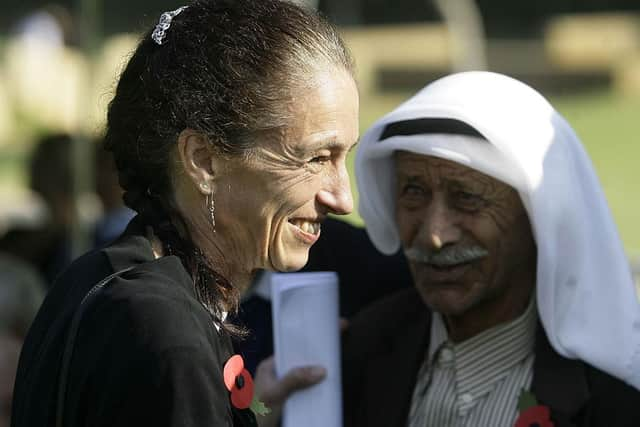Exclusive:Yemen bombings: Former British ambassador to Yemen warns of 'many dangers' in UK and US strikes against Houthi rebels
A former British ambassador to Yemen has told The Scotsman there are “many dangers inherent” in the air strikes launched by the UK and US against Houthi sites, and warned the military action would strengthen the credibility of the Iran-backed militia in the eyes of many ordinary Yemenis.
Frances Guy, from Edinburgh, said she expected the Houthis to launch retaliatory missile attacks. She expressed concern that Yemen’s civilian population, which is already facing a parlous humanitarian situation, would suffer further if the fragile truce between the country’s warring factions was shattered.
Advertisement
Hide AdAdvertisement
Hide AdIt comes as a professor of international relations at the University of St Andrews said there were doubts as to the impact of the strikes, with scrutiny required of the long-term goals of the military action.
Professor Stephen Gethins, who sat on the Commons Foreign Affairs Select Committee during his time as an SNP MP, said there was a risk of the UK being “drawn in” and “perceived as a combatant”. He said while there was an “immediacy” to stopping the Houthi attacks on shipping in the Red Sea, it was unclear what the air strikes would achieve.
Amid rapidly escalating concern the bombardment could spark retaliation and a wider conflict in a region already reeling from the Israel-Gaza war, there are mounting questions over the decision to strike Houthi targets in response to a slew of drone and missile attacks on commercial ships in the Red Sea.
Prime Minister Rishi Sunak, who will make a statement to MPs on Monday, said the “limited”, “necessary” and “proportionate” air strikes were intended to “degrade and disrupt” Houthi capability. He stressed the UK would continue to monitor the situation. “It’s clear that this type of behaviour can’t be met without a response,” he said.
However, the nature of that response is coming under intense scrutiny, with fears that further attacks will come not just from the Houthis, but other Iranian allied militias in Syria and Iraq. There is also significant disquiet about the repercussions of any heightened conflicts in Yemen, where more than 150,000 people have been killed in the civil war.


Ms Guy pointed out that only last month, the warring factions in Yemen committed to steps towards a ceasefire and to engage in a United Nations-led peace process. She expressed concern the impact of the latest events would make things worse for the Yemeni population at large.
“Whilst the Saudis were probably informed in advance, the strikes risk undermining that fragile peace as well as risking an increase in food prices in an already difficult humanitarian context in Yemen,” she said. “But the strikes will also strengthen Houthi credibility in the eyes of much of the Yemeni – and arguably wider Arab – population and undermine the US even if there was notional approval from the UN Security Council.”
Ms Guy, based in Yemen's capital Sana'a between 2001 and 2004, said she expected the Houthis to retaliate, but emphasised that ending the fighting in Gaza was the best way forward to preventing any further escalation in the Middle East.
Advertisement
Hide AdAdvertisement
Hide Ad“I don’t think the Houthis are at the beck and call of the Iranians even if Iranian support is very important, as is possibly intelligence on movement of ships in the Red Sea,” she said. “Houthis in the past have not responded to pressure necessarily and will likely seek to launch at least some missiles to demonstrate that they still can.”


Ms Guy, who also served as Britain’s ambassador to Lebanon, added: “Of course attacks on shipping are problematic, but according to the Houthis they stopped attacks during the seven-day truce on Gaza – so it would still seem that an immediate ceasefire in Gaza is the best option to end conflict spreading in the region.
“Now the US have demonstrated that they can hit Houthi targets, all efforts should double down for a ceasefire in Gaza and the US, working through the Saudis and the UN, need to reach out to Houthis and keep the truce in Yemen alive for the sake of the Yemeni people who have suffered more than enough.”
Prof Gethins, professor of practice in international relations at the Centre for Global Law and Governance at University of St Andrews, said there were doubts as to the impact of the UK and US strikes targeting military facilities, with scrutiny required of the long-term goals.
“There is a question mark over the effectiveness of these high-level, pinprick airstrikes, especially in a country as diverse and devastated by war as Yemen has been over the past few years,” he said. “It’s very, very difficult to think these kinds of strikes will go any way to solve the problem you’re trying to address – in this case, radicalisation and instability in Yemen, fuelled by Iran.


“There’d be a concern that if you undertake military action without a long-term approach as to what it is for, there is always a danger you can end up making it worse, and being drawn in and perceived as a combatant in a situation where you weren’t previously.”
Dr Jamie Allinson, senior lecturer in politics and international relations at the University of Edinburgh, said it was unlikely the strikes would have an impact on Houthi operations. But he said that if the US and UK pushed for a ceasefire in Gaza, that could change. “The Houthis are exercising their leverage to influence that conflict,” he said. “They’ve done this before, attacking Saudi oil installations, for example.”
Dr Allinson added: “This is a very reactive move by the US and UK. They don’t seem to have any point they want to achieve. They’re not going to go and occupy Yemen, which would obviously be out of the question, and that means the Houthis will come back. The fundamental issue is further north with the Israeli campaign in Gaza.”
Comments
Want to join the conversation? Please or to comment on this article.